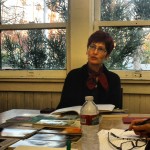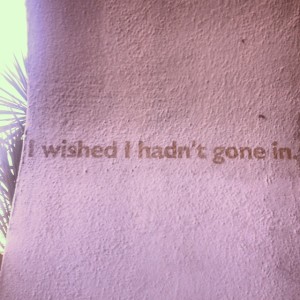Review by Sarah Suzor, Omnidawn features writer
Who: Karren Alenier and Margo Taft Stevers
What: A lecture and workshop on selecting award-winning manuscripts
When: Sunday, January 20th, 2013
Where: Beyond Baroque, 681 Venice Blvd. Venice.
Check out more Beyond Baroque events here:
http://www.beyondbaroque.org/
I love a good book prize, but I may be partial because I’ve won a couple. There’s a lot of hype, or hearsay, behind prizes. Are they rigged? Is the “blind” selection process always “blind?” I don’t know, but there’s plenty of information on the Internet about all those questions. The prizes I have won have been completely legitimate. I won the 2010 Hudson Prize from Black Lawrence Press. I was 28 when I won, and a total no-name author with no favors to offer Black Lawrence. My book The Principle Agent was the selected as the winner that year. I ate, slept, and breathed that manuscript. My dreams were based on how to fix this poem, or alter that section. It was my everything. All this to say: I know why I won; The Principle Agent, to me, is as flawless as I am capable of making it. I’m not over-estimating my poetic prowess; I am just saying that I believe submitting to book prizes has demanded my highest-quality work. My prize-winning manuscripts are my best manuscripts. They’re thematic, engaging, and the ones I’ve put the most effort into completing. Karren Alenier, co-editor at The Word Works, and Margo Taft Stevers, co-editor at Slapering Hol Press, have had a lot of experience selecting prize-winning manuscripts. Both have been co-editors at their respective presses for over ten years. The Word Works is a press headquartered in Washington D.C., and is now offering two annual prizes: The Washington Prize (which publishes a full-length, perfect-bound collection of poems), and the Hilary Tham Capitol Competition (which publishes a full-length collection from an unpaid volunteer working in the literary non-profit industry—the non-profit organization must nominate the writer). Slapering Hol Press (based out of New York) is an imprint of The Hudson Valley Writers’ Workshop. It produces gorgeous, hand-sewn chapbooks, and every year a manuscript is selected for the Slapering Hol Press Chapbook Competition. SHP also targets emerging writers. Recently I sat down with Karren, Margo, and a group of emerging and established poets at Beyond Baroque in Venice, CA. for a workshop and lecture on constructing, and the selection process behind, prize-winning manuscripts.
Karren and Margo both agreed there is no one trick to winning a competition. They noted some of the obvious rules of participation: stick to the press’ guidelines, and become familiar with what the targeted presses have published recently. They also offered some detail-oriented attention-grabbing tips; for instance, Karren emphasized the importance of opening and closing poems. The first poem is the key piece to making the reader turn another page. It usually has the power to invite a reader in or push a reader away. Closing the book is equally important simply because the last poem is the last sentiment you leave with the reader. I am an editor for a small press, and when I am halfway through a manuscript I find appealing, I always flip to the final five poems to see how carefully or carelessly the book ends. If it ends as intriguing as it began, I keep reading the submission.
Margo came to the workshop with statistics. She had interviewed six prize-winning authors about their experiences with successful submissions. She mentioned that many of those she interviewed had published about one-third to one-half of their prize-winning manuscripts in literary journals and online magazines. She said through this process an author often gains a sense of what poems are the most appealing to the general population. Also, when a competition is not read blindly, and it requires a list of acknowledgements, a long list of previous publications can be pretty eye-catching to an editor. I find more exceptions to this rule all the time, especially when a book is written so serially that individual poems build on the momentum of one another throughout the manuscript, but I cannot deny that the information presented in cover letters does pique my interest in a prospective author.
My favorite tip from the lecture was one that I feel is extremely overlooked: if you are writing contemporary poetry, read contemporary poetry. Karren was very insistent on this statement, and rightfully so. Purchasing poetry from small presses offers a financial contribution to the industry, but it also allows insight into what your peers are producing. I would take Karren’s sentiment and add: read Victorian poetry, or modern poetry; read poetry you think is horrible, wonderful, life changing, or mundane. The shared opinion here is: if you want to write anything, read it thoroughly. The crowd at Beyond Baroque seemed to pick up on this cue pretty well because by the end of the workshop both Karren and Margo were selling not only Slapering Hol and The Word Works books, but also their own poetry collections.
Beyond Baroque is an anomaly of sorts. The outside looks like a church, but walking through its door is like traveling back in time to when free love was at its peak. To the right there’s a performance venue set up as a mini-theater, and to the left there’s a large library/bookstore. It’s one of the only bookstores on the Westside of Los Angeles that sells books primarily produced by small presses. It’s located on Venice Blvd., blocks from the intersection of one of the most high-end, trendy streets in North America, Abbot Kinney Blvd. Nestled in this super hip environment, Beyond Baroque serves as a low-key venue hosting workshops, readings, and other events for writers, publishers, and artists from around the globe. As the neighborhood collects more corporate clothing stores and five-star restaurants, used book stores and local artist galleries are the first to be shutting down their storefronts, leaving Baroque an essential commodity for those looking to attend or participate in the more “out of the box” productions. Baroque’s future line-up includes a February 15th open mic hosted by Lynne Bronstein geared toward “Bad poetry only,” and a March 10th book release for poet Frank Samperi’s Trilogy, which combines three of his books written between 1971 and 1973. Beyond Baroque is a fixture and, in many ways, the artists’ last home in the area. Nearly 45 years in business, Baroque’s motto is “Keeping Freedom of Speech Alive,” and it relentlessly continues to house some of the only events in Venice that resemble and embody the troubadour mentality that put the place on the map.
So here we were, a stone’s throw from $30 plates of spaghetti, $400 vintage jeans, and we’re talking about books ranging from $14 to 25¢. Around the corner the paparazzi were mauling Halle Berry, but sitting in Beyond Baroque, this safe haven for artists and writers, the infiltration of the surrounding environment seemed as unrealistic as a chapter in a novel. The two vibes, located so close to each other, are so drastically different that it is impossible to be in the presence of such a deliberate gathering and not contemplate the future of publishing. Let’s be honest–our culture, especially in Los Angeles, has progressively moved toward easy-access and instant gratification. For better or for worse, that’s a technological argument I stay out of, but reading, writing, even seeking poetry for purchase is not on that same fast-track pace. In fact, I would argue, poetry exists to defy that momentum. Beyond Baroque, The Word Works, and Slapering Hol Press are living examples of a continued commitment to the art of writing. Looking around Baroque’s library is both humbling and inspiring, as was glancing across the table at Karren and Margo’s ten-year-old collections of publications. One of Karren’s sentiments will forever stick in my mind: “Writing is a very isolated career,” she said; “that’s why places like this, where writers can gather as a community, are so important.”
Karren and Margo were both hopeful about the direction small presses are moving in, which I always find refreshing. They said the Internet has made book distribution much easier, and they encouraged the audience members to participate in any kind of social media possible in order to promote their books and their writing careers. Like I mentioned earlier, Slapering Hol Press seeks to publish emerging writers, and with The Word Works’ new Hilary Tham Capitol Competition (accepting manuscripts from only those writers working as an unpaid volunteer in a non-profit literary organization), these two presses seem to offer ample opportunities for new writers to enter the prize-winning sphere.
The Word Works selected B.K. Fischer’s St. Rage’s Vault as the winner of the 2012 Washington Prize.
Karren noted, “What stands out about this manuscript, which will be launched in March at the 2013 AWP Boston, is that it looks at creativity and motherhood in a unique way– every poem is based on a piece of art but the reader doesn’t know that until he or she looks at the notes at the end of the book.”
From St. Rage’s Vault:
WEEK 30 (Maternity Bathing Suit)
Forget those gilded mamas,
she’s a magic marker Venus de Milo
at the open swim, a cellulite bird
of blub and doodles full of words,
A-E-I-O-U and growing
a varicose cosmos
of pantihoseless possibility, up to her anatomy in irregular stars,
her daisy-decal polka-dot pliant bingo bottom buoyant enough
to balance an elephantine arabesque
off the ladder, smile
at mister-smug-one shrunk
in his trunks in front of
her flagrant magenta bellyful
of flutterkicks—O shaky bravura—
and drop, splashless,
into water over her head.
The winner of the 2012 SHP Chapbook Competition is A Disturbance in the Air by Michele Poulos. Margo said the manuscript was chosen “…because the chapbook is suffused with lyrical intensity, rhythmic voluptuousness, and clarity of deep image and metaphor. While the landscape ranges from Greece to New Orleans, the collection binds together with a visionary urgency.”
From A Disturbance in the Air:
The Golden Age of Herbalists
When he throws a fist of parsley into the pond,
the man believes the ailing fish will heal. In 1540,
William Turner studied plants for the resolve
within each one: wolfberry for scars;
lye from gentian roots to clean cloth;
cardamom to soothe snake venom.
As a boy, he had found his mother on the kitchen floor,
body bent in half, coughing, eyes watering
and locked on a distant plane. He fed her evening
primrose oil and the immense choke loosened;
she breathed once again.
They were more than simples to heal bones
and cure diseases — he studied their moods, their networks of
be seed, be influence. You, who are always trying.
When he finally took to the countryside, he carried
a sack and a knife, dusk settling
on leaf-points as if in the summer months
their passions were precisely edged.
Standing alone in the meadow, he knew everything
he caught sight of was in the dying
and would die before he would, yet he held
in his hands a garden, an herbal
he would pen against sickness, soreness, wounds,
the formulas behind the labyrinth of green
unfolding before him.
Like I said, I love a good book prize. Winning one changed my life. I believe that Margo and Karren are contributing to some of the most important, exciting elements of small press publishing. It’s prizes and fellowships that keep publishing opportunities accelerating, and it’s publishing opportunities that keep the poetry community moving forward. My last suggestion for prize-winning is this: do some research. There are a lot of competitions geared toward certain demographics. There’s the James Laughlin Award, which honors a poet’s second book. There’s Finishing Line Press’ New Women’s Voices Award, publishing a poetry chapbook by a woman who has yet to publish a full-length collection. Cater submissions to your personal demographic. There’s an opportunity out there for just about everyone. (A link to more prizes here.)
The deadline for the SHP Chapbook Competition is May 15th, 2013. Prizes include $1,000 cash award, ten books and a reading at The Hudson Valley Writers’ Center.
The Washington Prize is accepting submissions until March 15, 2013. Prizes include $1,500 and book publication.
Nominations for the Hilary Than Capitol Collection are due by April 1st, 2013, and the submission deadline for manuscripts is May 1st, 2013.
 Karren LaLonde Alenier of Chevy Chase, MD is author of six collections of poetry, including On a Bed of Gardenias: Jane & Paul Bowles and Gertrude Stein Invents a Jump Early On, an opera with composer William Banfield. For Scene4 Magazine, she writes a monthly column on Gertrude Stein, opera, and the arts.
Karren LaLonde Alenier of Chevy Chase, MD is author of six collections of poetry, including On a Bed of Gardenias: Jane & Paul Bowles and Gertrude Stein Invents a Jump Early On, an opera with composer William Banfield. For Scene4 Magazine, she writes a monthly column on Gertrude Stein, opera, and the arts.
 Margo Taft Stever of Sleepy Hollow, NY is the author of three collections of poetry, including The Hudson Line, and she co-authored William Howard Taft and the 1905 U.S. Diplomatic Mission to China. She is founder of The Hudson Valley Writers’ Center and founding editor of HVWC’s Slapering Hol Press.
Margo Taft Stever of Sleepy Hollow, NY is the author of three collections of poetry, including The Hudson Line, and she co-authored William Howard Taft and the 1905 U.S. Diplomatic Mission to China. She is founder of The Hudson Valley Writers’ Center and founding editor of HVWC’s Slapering Hol Press.
 Sarah Suzor’s full-length collection of poetry, The Principle Agent, won the 2010 Hudson Prize and was recently published by Black Lawrence Press. She also has a forthcoming collaboration, After the Fox, which is co-authored with Travis Cebula, and will be available from Black Lawrence Press in 2014. Suzor’s poetry has been published widely, as well as anthologized, translated and nominated for the Pushcart Prize. She lives in Venice, California where she is a founding editor for Highway 101 Press, as well as covering the Los Angeles reading scene for Omnidawn’s online magazine, OmniVerse. She is also a guest lecturer for the Left Bank Writers Retreat in Paris.
Sarah Suzor’s full-length collection of poetry, The Principle Agent, won the 2010 Hudson Prize and was recently published by Black Lawrence Press. She also has a forthcoming collaboration, After the Fox, which is co-authored with Travis Cebula, and will be available from Black Lawrence Press in 2014. Suzor’s poetry has been published widely, as well as anthologized, translated and nominated for the Pushcart Prize. She lives in Venice, California where she is a founding editor for Highway 101 Press, as well as covering the Los Angeles reading scene for Omnidawn’s online magazine, OmniVerse. She is also a guest lecturer for the Left Bank Writers Retreat in Paris.
